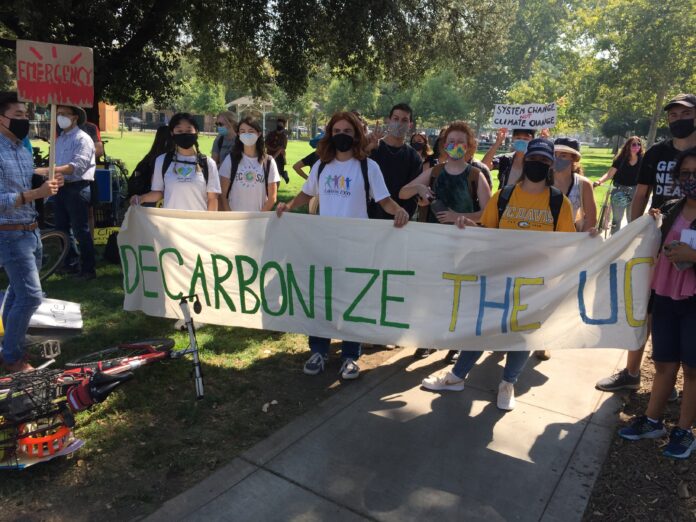UC Davis joins other city-wide and worldwide efforts to promote sustainability
By SHRADDHA JHINGAN — city@theaggie.org
A petition and campaign launched on Nov. 1 urged UC Davis officials to end the use of fossil fuels “as a source of energy for UCD campuses by 2030.” As of Nov. 18, the “Fossil Free UCD” petition had garnered 1,033 signatures, which consist of 232 faculty members, 608 UC Davis students, 134 staff members, 96 UC Davis alumni and 21 other UC Davis affiliated people.
The petition highlights global warming as something that should be immediately addressed. According to the petition, UC Davis should be commended for funding a campus project called the Big Shift, which involves steam pipes being changed to hot water and buying more renewable energy. Big Shift is a “goal for all the UC’s to achieve net zero greenhouse gas emissions by 2025” set by the UC Regents, according to its web page.
However, more than 150,000 metric tons of carbon dioxide are produced each year on campus, mostly for the burning of natural gas for cooling and heating purposes. Though the purchase of carbon offsets is planned post-2025, the petition claims this is not a sustainable solution.
“We realize that moving beyond fossil fuels to sustain our critical teaching and research missions is going to require massive commitment,” the petition reads. “However, as a top undergraduate and research campus, part of a renowned university system that is unique to the world, we have an obligation to live up to our sustainability aspirations. If we cannot do this, who will?”
Stephen Wheeler, a professor in the Department of Human Ecology who is also involved with Fossil Free UCD said that there have been various movements to encourage the UC regents to stop “fossil fuels investments as a way to signal the university’s commitment to a non fossil fuel oriented economy.” A 10 year campaign eventually led to a vote in 2019 to ask the regents to stop fossil fuel investments, and was signed by approximately 3,500 students and faculty. As a result of this, the regents decided to stop fossil fuel investments and the fossil fuel investments were sold by 2020. This movement was also recreated at other universities across the country and world.
“Now, we have had the carbon neutrality initiative, so called, in the UC system since 2013,” Wheeler said. “Which was a plan by former President Janet Napolitano for the university to be carbon neutral for on campus emissions, which are known as scope one and purchased energy from off campus which is known as scope two energy, by 2025 which was great and did lead to a lot of progressive action by UC Davis and other branches of UC.”
However, Wheeler also noted that there are problems with offsets. Additionally, instead of focusing on reducing emissions in other areas, it is important to also concentrate on reducing emissions in California and the U.S. Thus, over the past year, there has been a fossil fuel campaign system to encourage all UC campuses to become fossil free.
“There have been meetings with the UC wide Academic Senate, including just this past week, which has been very supportive, and meetings with some people in the UC Office of the Presidents, and they have shown support but a lot of unwillingness to talk,” Wheeler said. “And there are efforts at different UC’s.”
For instance, the chancellor at UC San Diego committed “a quarter million dollars to develop a plan for electrifying the campus and stopping use of natural gas for heating and cooling, which is the main use on campus,” Wheeler said. UC Berkeley has also committed one million dollars for a study similar to this. Subsequently, there have been efforts to get UC Davis to become involved in “climate leadership.”
Wheeler said that there was a meeting with the Provost and Chancellor a year ago to discuss sustainability leadership, and though they were open to discussion, the only outcome since then has been the Chancellor’s Sustainability Task Force. There will be another meeting in the next month with the Chancellor, Provost and other officials.
“We don’t want the university just to do enough to brag about which tends to be the institutional incentive,” Wheeler said. “We want it to really be committed to being a global leader, and to think systematically about all its operations, and ways to better meet long term sustainability needs.”
This will have numerous benefits, Wheeler said, such as research and education opportunities, lower operating costs in the long run and, ultimately, worldwide respect.
The City of Davis is also developing “a robust 2020 Davis Climate Action and Adaptation Plan (CAAP) Update to identify a vision for City of Davis carbon neutrality, sustainability and climate actions,” according to the web page. The goal is to make Davis carbon neutral by 2040, while the target for California is 2045.
“The overall project goals have been to support city council actions to establish the climate action and carbon reduction policies,” Kerry Loux, a project manager for CAAP said in a CAAP Community Workshop. “Mostly we accelerated our carbon neutrality target to 2040 which is an aggressive goal and that’s what this CAAP is meant to do. We are incorporating and prioritizing equity and inclusion in our process. We have established that target I mentioned of 2040 with an interim target of 2030.”
Ultimately, such efforts will lead to a more sustainable future.
“Our future is one of hope and pride in the way that we’ve lived our lives,” writer Jackson Carpenter said in a TEDx Talk about reducing carbon footprints. “Everyone in this room has the power to choose that future today. You can just choose something other than fossil carbon. Your choice has never been more important; the world literally depends on it.”
Written by: Shraddha Jhingan — city@theaggie.org




